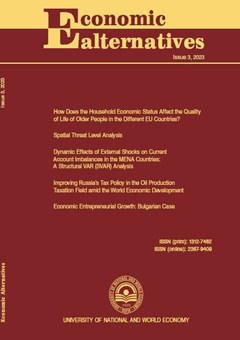Dynamic Effects of External Shocks on Current Account Imbalances in the MENA Countries: A Structural VAR (SVAR) Analysis
Authors: Rihab Bousnina, Foued Badr Gabsi
Abstract
In this paper, we tried to contribute to the previous literature by analyzing the effect of external and domestic shocks on the current account balance. Using a Structural vector autoregression (SVAR) technique, we specifically examine the effect of external and domestic shocks on the current account balance considering the case of the MENA region during the period 1970 to 2019. Our results indicate that the oil shock leads to a deterioration of the current account and a depreciation of the terms of trade while its impact in terms of growth is significant but more attenuated. For oil-importing countries, the magnitude of current account responses to shocks is much smaller on average than for oil-exporting countries. Our findings have important policy implications, especially in light of discussions in recent years about whether current account surplus countries impede growth abroad. Thus, the most important policy implication of this paper is that different channels would be used by economic policymakers to control the current account deficit.

